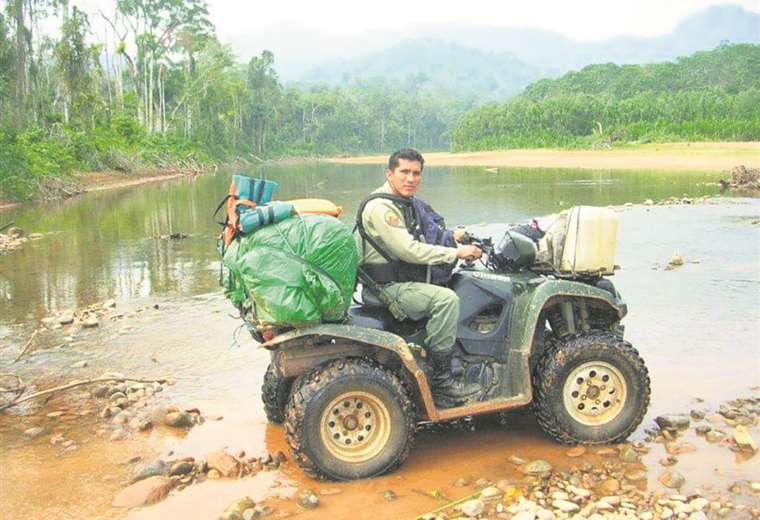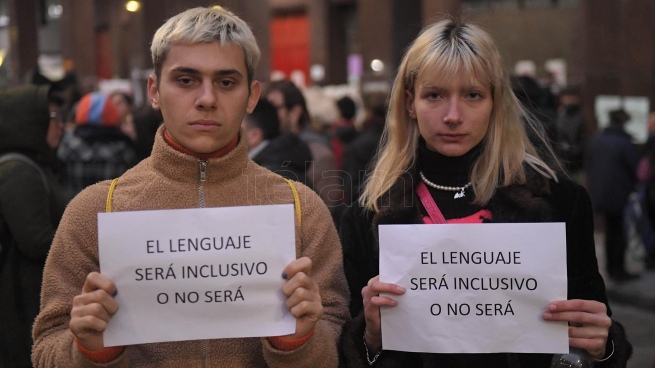July 13, 2022, 7:00 AM
July 13, 2022, 7:00 AM
He was born in San Buenaventura, on the banks of the Beni River, in the department of La Paz. At the age of four he lost his father, so his providers, for him and his siblings, were his mother and his grandmother.
Marcos Uzquiano Howard’s childhood was spent going to the chaco, looking for and cutting firewood, peeling rice in tacú, fishing, sometimes working in the chestnut harvest or other subsistence activities, in the mountains or the river.
This way of life gave him a special attachment to nature, not only the forest and the animals, but also the indigenous peoples, specifically the Esse Ejja, with whom he cultivated a very particular friendship, which deserves a separate chapter.
In 1998, when he was 22 years old, he began his work in protected areas, first as a volunteer in the Madidi National Park, then, in 2001 as a paid park ranger, and in 2011 as head of protection, after standing out in the public call.
As part of the exchange of experiences, it has rotated through other national protected areas, such as Apolobamba, Pilón Lajas, Tipnis and, the last one, now with a change of item, in the Beni Biological Station Biosphere Reserve.
This change took place in September of last year, and according to Uzquiano, it was as a result of his opposition and complaints about the illegal mining activities that have already entered the Madidi strict protection zone. This during his internship, from 2015 to 2019, in the direction of the Madidi National Park.
Through letters to the National Service for Protected Areas (Sernap), the parent entity of the park rangers, the organized miners expressed their rejection of Uzquiano, who was finally transferred, despite the fact that his wife and children live in La Paz. “And I moved with my own resources,” he says.
The most recent conflictive situation in the work of Marcos Uzquiano had to do with an administrative process that was followed from Sernap. According to him, it is an offense that does not even appear in the internal personnel regulations, they are applying the general regulations, the Safco Law, to sanction it. “It is a sanction for a short period that I was in Pilón Lajas, supposedly I did not notify about an administrative sanction”, explains the park ranger.
The final resolution on the issue, by the central office of Sernap, cost Uzquiano a 20% discount on his salary.
According to him, these processes will be used as an excuse for a subsequent definitive dismissal from his work, which is why he has filed an appeal for revocation and a hierarchical appeal before the Sernap summary authority; complaints before the Transparency Unit of the Ministry of the Environment and Water (MMAyA) and before the Ombudsman’s Office; and, finally, a first constitutional protection for the change of destination.
“They did the same to me as the park ranger Daniel Pacci, from Tunari Park, violating regulatory procedures,” he said, advancing that he will file another amparo for the summary process, in which, according to Uzquiano, they did not value his discharge evidence.
When consulted on the subject, the lawyer José Luis Zabala said that these strategies had already been carried out before, as part of commitments to get people in and out, and gave Marcel Caballero, former director of the ANMI San Matías, as an example.
“They are sanctioned for a ‘supposed’ violation of internal regulations, but they are uncomfortable talking to the press,” he said about the sanctions against Daniel Pacci and also Uzquiano.
When consulted, Miriam Blanco, the director of Human Resources at Sernap, replied that she was not authorized to speak, that an interview with the executive had to be arranged, but that in any case the sanctions were the result of administrative processes.
Marcos acknowledges that the work as custodian of the forest has never been easy, that even in his early days he worked very precariously, but he says that at least the offenders were prosecuted and sanctioned with fines, paid them and evicted the protected area, although protesting, but they went out
“Now, in many cases the same communities support the offender, they block the park ranger, they threaten him, they attack him, the processes are carried out and fines are imposed only as a salute to the flag, the offender pays and continues destroying with more force, failing to comply environmental regulatory procedures,” he says.
To his liking, in many cases it seems that there is no authority willing to enforce the protected areas or the park rangers, he even dares to maintain that the miners and offenders have more voice than the park rangers before the authorities.
“They attend to their requests with diligence and promptness, they even make the Protection chiefs and park rangers change at will. The Police and the Armed Forces do not come to the aid. The directors of the areas and the executive director of the Sernap, or they are afraid , or worse still, we even suspect that they are accomplices,” he alludes.
He asserts that forest fires were not so common either, at least not as serious as they are today, nor as frequently. He says that floods or rainy seasons were clearly defined, allowing communities to anticipate such events. He attributes this new dynamic to changes caused by global warming and climate change.
“It was also not very common to hear of land encroachments or drug trafficking, or clandestine trails within protected areas. However, now the strange thing is that it does not exist,” he laments.
And although the panorama looks very dark, Uzquiano believes that not everything is bad, since social networks have become a communication tool that increasingly shows the importance of the work of park rangers, the risks, threats and attacks against the protected areas.
“This has allowed an important level of awareness in Bolivian society, but at the same time I feel that a large part of that population that identifies with the protected areas through social networks, still does not take action on true lines of defense, and perhaps Sometimes they feel that it is enough to share or give a like”, he questions.
Those who know Uzquiano know of his rebellious and reckless essence. He says that these characteristics are based on the teachings of his mother, on the inalienable premise of defending what he believes is fair.
“Many times I do not measure consequences and I have been disappointed, but even so I am not willing to give up what I have been since I was a child. If one day I stop fighting for what I believe and support, nothing would make sense,” he concludes.
DATA
GOT THE ATTENTION
He has led a series of productive projects for the
development and sustainable tourism, defense of the jaguar, and its work has been publicized in international media such as National Geographic, Mongabay Latam, BBC, EFE, Telemundo, Forbes, etc.
ANOTHER GUARDIAN IN THE LOOK
Two days after making statements in EL DEBER about harassing park rangers who press to comply with the regulations, Daniel Pacci, custodian of Tunari, was notified of the change of item to Cotapata, in La Paz, despite the fact that his residence and his family They are in Cochabamba.
Marcos used his platforms to denounce anonymous threats through social networks. He limited himself to this space because the Police, he says, did not give it importance.















